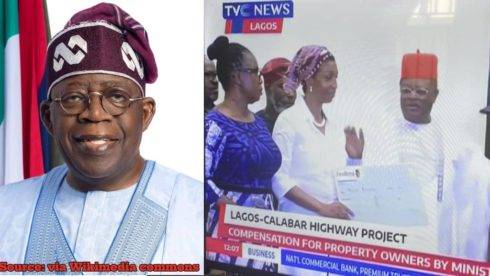In a step towards the construction of the highly anticipated Lagos-Calabar Coastal Highway, the Federal Government of Nigeria has allocated a staggering N2.7 billion for compensating affected property owners. This demonstrates the government’s unwavering commitment to infrastructure development while ensuring fair treatment and due process for its citizens.
The compensation payout covers structures along the first 3 kilometers of the project’s corridor in Lagos State, and the disbursement process was personally flagged off by the Minister of Works, David Umahi. This high-level involvement underscores the vital importance of this coastal highway project for the nation’s economic growth and enhanced regional connectivity.
Federal Government:Minister David Umahi Oversees Demolition, Emphasizes Engineering Excellence
During the compensation payout ceremony, Minister David Umahi took the opportunity to address concerns raised by property owners along the project’s right of way. Demonstrating his commitment to transparency and accountability, the Minister personally supervised the demolition of buildings that encroached on the designated corridor.
Umahi stressed the importance of adhering to engineering standards, stating, “While some may choose to play politics, as an engineer, my responsibility lies in executing the engineering work with utmost precision and professionalism.” His remarks underscored the government’s determination to deliver a world-class infrastructure project that meets international standards.
Federal Government: Landmark Owner’s Concerns Addressed by Resolute Minister
Among the affected property owners was a prominent politician, whose landmark structure fell within the project’s right of way. Minister David Umahi acknowledged the concerns raised by this individual but maintained his unwavering stance on prioritizing the nation’s development over personal interests.
I understand the sentiments expressed by the Landmark owner, who happens to be a politician,” Umahi stated. “However, as the Minister of Works, my role transcends politics. It is my duty to ensure that this vital infrastructure project is executed efficiently and without compromise, for the greater good of all Nigerians.
Federal Government: Compensation Process Ensures Fair Treatment of Affected Residents
The compensation payout process has been meticulously planned and implemented to ensure fairness and transparency. Independent valuers were engaged to assess the affected properties, and compensation amounts were determined based on their market value, ensuring that no individual or community was unfairly disadvantaged.
The Federal Government has emphasized its commitment to upholding the rights of citizens and providing adequate compensation for any losses incurred as a result of the project’s execution. This approach aims to foster trust and goodwill among affected communities, paving the way for seamless project implementation.
Federal Government: Clearing the Way for Economic Growth and Connectivity
The Lagos-Calabar Coastal Highway project is a strategic infrastructure initiative that promises to unlock significant economic opportunities and enhance regional connectivity. By providing a direct link between Lagos, Nigeria’s commercial hub, and Calabar, a major port city, the highway is expected to facilitate the efficient movement of goods and services, boosting trade and economic activities.
Furthermore, the project is anticipated to stimulate development in the communities along its route, creating employment opportunities and fostering growth in various sectors, including tourism, agriculture, and manufacturing. The government’s commitment to compensating affected property owners demonstrates its dedication to balancing development needs with the well-being of citizens.
Federal Government:A Transparent and Inclusive Approach to Nation-Building
The Federal Government’s handling of the compensation process for the Lagos-Calabar Coastal Highway project exemplifies its commitment to transparency, inclusiveness, and adherence to due process. By engaging with stakeholders, addressing concerns, and providing fair compensation, the government aims to foster trust and collaboration among communities impacted by the project.
As Nigeria continues its journey towards infrastructure development and economic growth, the Lagos-Calabar Coastal Highway project stands as a testament to the government’s resolve in prioritizing the nation’s progress while upholding the rights and interests of its citizens. This approach sets a precedent for future infrastructure initiatives, paving the way for sustainable and equitable development across the country.
Table of Contents
Discover more from OGM News NG
Subscribe to get the latest posts sent to your email.














